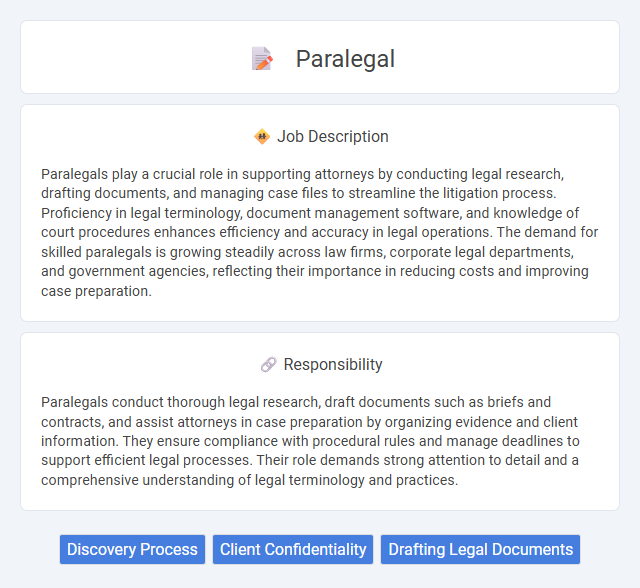
Paralegals play a crucial role in supporting attorneys by conducting legal research, drafting documents, and managing case files to streamline the litigation process. Proficiency in legal terminology, document management software, and knowledge of court procedures enhances efficiency and accuracy in legal operations. The demand for skilled paralegals is growing steadily across law firms, corporate legal departments, and government agencies, reflecting their importance in reducing costs and improving case preparation.
Individuals with strong organizational skills and attention to detail are likely to thrive as paralegals, given the job's demands for managing legal documents and supporting attorneys. People who enjoy research, writing, and working in a structured environment may find the paralegal role suitable for their abilities and preferences. Those who prefer dynamic client interactions or leadership positions might find this job less fitting due to its more supportive and detail-oriented nature.
Qualification
Paralegal qualifications typically include an associate's degree in paralegal studies or a bachelor's degree combined with a paralegal certification from organizations like NALA or NFPA. Strong knowledge of legal terminology, research skills, and proficiency in case management software are essential for successful job performance. Employers often seek candidates with experience in document preparation, legal writing, and an understanding of courtroom procedures.
Responsibility
Paralegals conduct thorough legal research, draft documents such as briefs and contracts, and assist attorneys in case preparation by organizing evidence and client information. They ensure compliance with procedural rules and manage deadlines to support efficient legal processes. Their role demands strong attention to detail and a comprehensive understanding of legal terminology and practices.
Benefit
Paralegal jobs likely offer significant benefits such as gaining valuable legal experience and enhancing career prospects within the legal field. They probably provide opportunities for skill development in areas like research, case management, and client communication. The role may also offer competitive salaries and potential for job stability in growing legal sectors.
Challenge
A paralegal job likely presents the challenge of managing complex legal documents and strict deadlines, requiring high attention to detail and organizational skills. It probably demands the ability to navigate intricate legal procedures and support attorneys effectively under pressure. Mastery of legal research and communication skills may also be crucial to overcoming daily challenges in this role.
Career Advancement
Paralegal career advancement often involves gaining specialized certifications such as the Certified Paralegal (CP) or Advanced Certified Paralegal (ACP) credentials, which enhance expertise in areas like litigation, corporate law, or intellectual property. Building proficiency in legal research software, e-discovery tools, and case management systems increases opportunities for promotion to senior paralegal or legal manager roles. Networking within law firms and pursuing continuing legal education (CLE) can lead to supervisory positions or transitions into related fields like compliance or contract management.
Key Terms
Discovery Process
The paralegal plays a crucial role in the discovery process by managing the collection, organization, and review of key evidence and documents. They assist attorneys with drafting interrogatories, requests for production, and subpoenas, ensuring compliance with deadlines and procedural rules. Proficiency in electronic discovery (eDiscovery) tools enhances efficiency in handling large volumes of digital data during litigation.
Client Confidentiality
Paralegals play a crucial role in maintaining client confidentiality by safeguarding sensitive legal information and ensuring compliance with privacy laws and ethical standards. Strict adherence to confidentiality protocols protects client interests and upholds the integrity of the legal process. Effective management of confidential records and secure communication channels prevents unauthorized access or disclosure of privileged information.
Drafting Legal Documents
Paralegals play a crucial role in drafting legal documents, including contracts, pleadings, affidavits, and wills, ensuring accuracy and compliance with legal standards. Expertise in legal terminology and meticulous attention to detail are essential for preparing documents that support attorneys effectively. Proficiency in legal research tools and document management software enhances the efficiency and precision of drafting processes.
 kuljobs.com
kuljobs.com